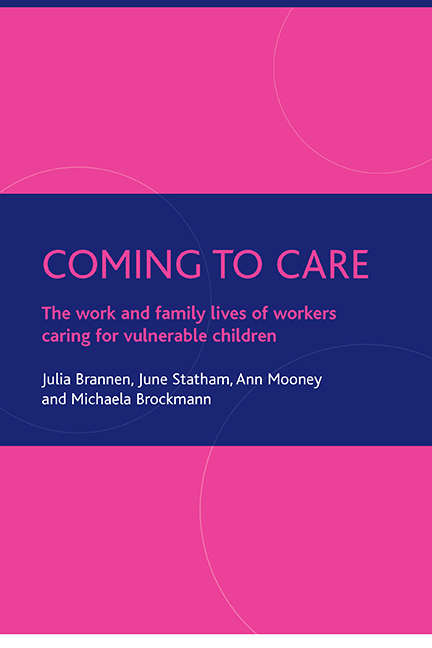Book contents
- Frontmatter
- Contents
- List of tables and boxes
- Acknowledgements
- one Setting the scene
- two The study
- three The origins of a care ethic in care workers’ childhoods
- four Entering care work with vulnerable children
- five Care workers’ careers and identities: change and continuity
- six What do vulnerable children need? Understandings of care
- seven Experiences of care work
- eight Leavers, movers and stayers
- nine Managing care work and family life
- ten Conclusions and policy implications
- Appendix: Boxes and additional tables
- References
- Index
eight - Leavers, movers and stayers
Published online by Cambridge University Press: 15 September 2022
- Frontmatter
- Contents
- List of tables and boxes
- Acknowledgements
- one Setting the scene
- two The study
- three The origins of a care ethic in care workers’ childhoods
- four Entering care work with vulnerable children
- five Care workers’ careers and identities: change and continuity
- six What do vulnerable children need? Understandings of care
- seven Experiences of care work
- eight Leavers, movers and stayers
- nine Managing care work and family life
- ten Conclusions and policy implications
- Appendix: Boxes and additional tables
- References
- Index
Summary
Introduction
In this chapter, we consider questions concerning who stays and who leaves childcare work and why. We also examine movement between different types of work with vulnerable children, since this has particular relevance for government policies to encourage greater flexibility and transferability across the childcare workforce (see Chapter One).
A number of studies have examined reasons for the recruitment and retention difficulties affecting the social care workforce, many of them based on cross-sectional quantitative data. For example, an investigation by the Audit Commission (2002) identified six key factors in people's decisions to leave public sector work: a sense of being overwhelmed by bureaucracy and paperwork; insufficient resources leading to unmanageable workloads; a lack of autonomy; feeling undervalued by managers, government and the public; pay that was felt ‘unfair’ compared to that of people doing similar work; and a climate of change that felt imposed and irrelevant. A survey of over 2,000 readers conducted by Community Care magazine on the reasons why people stay in or leave social care jobs found that the main reasons for staying were job satisfaction and good relationships with colleagues and managers, while the main reasons for leaving were poor relationships with managers, poor pay and working conditions, and workloads that were too high (Winchester, 2003).
Turning specifically to studies of retention among childcare workers, most findings are again based on survey data. Research with foster carers has identified four main reasons for ceasing to provide such care: seeing fostering as no longer fitting into their lives (for example because of getting older, their family situation changing or wanting to take up work outside the home); lack of support for the fostering work; the impact of caring on their families; and distressing events such as placement breakdowns, allegations being made against them by the children or difficulties experienced with birth families (Sinclair et al, 2004). Among staff in children's homes, reasons given for thinking about leaving include wanting to make more use of qualifications, children's difficult behaviour, feeling discouraged by children's lack of progress, and feeling it is time to make a career change (Mainey, 2003).
- Type
- Chapter
- Information
- Coming to CareThe Work and Family Lives of Workers Caring for Vulnerable Children, pp. 153 - 176Publisher: Bristol University PressPrint publication year: 2007



